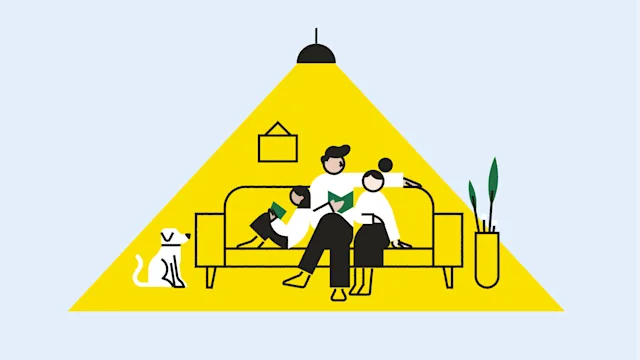Key takeaways:
Empty nest syndrome describes the grief, worry, and/or loneliness that some parents feel when their grown children leave the family home.
Empty nest syndrome is not a psychiatric disorder or diagnosis. And it doesn’t cause long-term emotional distress for most parents. It usually appears as a challenging but brief period.
Once parents adjust to their new routines, many discover benefits to having an empty nest.
When young adult children move out of the family home, it signals a big shift not just for them but for their parents too.
Transitioning out of the daily caretaker role affects parents in different ways. It can mean long-awaited freedom and a chance to pursue (or return to) interests and hobbies. But reaching the end of your active parenting years can also come with feelings of loss.
Read on to learn more about this adjustment period known as empty nest syndrome.
What is empty nest syndrome?
Empty nest syndrome describes the complex emotions parents may feel when their children leave home.
The idea was introduced in the early 20th century and made its way into the mainstream in the 1970s. The term is frequently used in pop culture. But empty nest syndrome isn’t an official mental health diagnosis, said Dr. Emily Guarnotta, a clinical psychologist and GoodRx contributor.
Rather, it’s “a helpful way to describe some of the emotional changes” that some parents experience during this transition, she said.
Empty nest syndrome is normal. And it can show up as a variety of different feelings that will vary from person to person.
Most common signs of empty nest syndrome
It’s important to note that empty nest syndrome hasn’t been extensively studied. Most of the existing research centers on families with heterosexual, married parents. Less is known about how empty nest syndrome affects single-parent households, blended households, and LGBTQ+ families.
And empty nest syndrome will be experienced differently depending on a person’s cultural background and expectations about family life.
What to expect in couples therapy: Every couples therapist — and couple — is different. Still, here’s what you can expect when you start couples therapy.
Tips for caring for an older parent: How do you know if your aging parent needs help? There are signs — like trouble walking or difficulty eating — that suggest they may need more support.
Signs you’re in a healthy relationship: Partners in healthy relationships show certain behaviors that set them apart from those in less healthy ones.
But, according to Guarnotta, there are some common emotions — or “symptoms” — parents often experience. These are presented below, drawn from an interview Guarnotta gave to GoodRx.
Grief
The absence of your children in the home can feel like a space that’s impossible to fill, at least at first. You may feel grief over your child’s departure. That’s true even if they left for a positive reason, such as starting college or accepting a job.
If you’re a primary caregiver or have a close relationship to your children, you may experience grief more deeply. You might feel:
A change in your sense of self and identity
Loss over the end of the childhood phase
Regret about past challenges in your relationship with your child
Read more like this
Explore these related articles, suggested for readers like you.
Worry
It’s normal to worry about your children living independently for the first time. You may feel a loss of control or influence over their decisions. This can lead to concern about their day-to-day well-being. You may worry about how they’ll navigate the world safely.
It can help to remember that in most cases, letting adult children make their own decisions is an important part of the transition to adulthood. But that doesn’t mean it’s an easy adjustment to make.
Loneliness
During the child-rearing years, it’s common for parents to shape their daily lives around their children’s needs. But as you transition to an empty nest, you’ll likely have more unscheduled time on your hands. While this may feel freeing to some, it can also be overwhelming.
Mixed feelings
Don’t be surprised if you have mixed or even conflicting feelings as a new empty nester, Guarnotta said. It’s normal to experience a range of emotions at the same time, including:
Relief
Sadness
Anticipation
Worry
Pride
The empty nest period can be “a very complex developmental period in the lives of parents,” she said. This is because other major life transitions are often taking place at the same time, including:
Retirement or other professional transitions
Hormonal shifts associated with perimenopause and menopause
Caring for aging parents
According to Guarnotta, the combination of life events can add to the emotional weight of the moment.
How to deal with empty nest syndrome
Particularly during moments of transition or stress, it’s important to tend to your physical and emotional wellness. Guarnotta has the following tips for weathering empty nest syndrome:
Commit to daily self-care. Prioritize getting quality sleep, exercise, and nutrition every day. If it feels good, aim to meditate, do yoga, take a tai chi class, or do any other mind-body practices that help you find balance.
Pursue new opportunities and activities. If a newly empty nest has opened up time in your schedule, use that time with things that you love. Many people dive deeper into work, hobbies, volunteering, or socializing. More freedom to travel is another perk enjoyed by many empty nesters.
Share your feelings. If you have friends who’ve been through a similar transition, share your feelings and gather their perspectives. If you’re partnered, share with your spouse how you feel — and regularly check in to see how they’re doing too.
Keep in touch with your adult children (but not too much). It can be tricky to find a healthy balance. Try to resist micromanaging or insisting that they stay in close contact.
Talk to a therapist. Support from a therapist can help you work through the feelings of this transition. This can be especially helpful if other big life events are coinciding with the empty nest adjustment.
Find an empty nesters’ support group. Look online and ask around about groups to join with parents at the same stage.
Empty nest syndrome can feel emotionally intense. But the good news is that it’s usually short term and will improve, Guarnotta said.
Are there benefits of having an empty nest?
Yes. Many parents feel positively about their children leaving home. Parenting and raising kids can be a source of stress and conflict in families. When they leave, many parents even find that their relationship with their adult child improves.
Other potential benefits of having an empty nest include:
Increased time for your own interests
Less time spent juggling work and family responsibilities
Greater connection with your partner or spouse
A more balanced relationship with your spouse
Frequently asked questions
Yes. Empty nest syndrome isn’t found in the Diagnostic and Statistical Manual for Mental Disorders (DSM), the handbook mental health professionals use to make diagnoses.
Instead, it’s a helpful term to describe the adjustment period some parents go through when their children leave home.
No. Not everyone experiences empty nest syndrome when their children leave home. Some parents make the transition with few difficulties.
According to Guarnotta, parents who are harder hit by empty nest syndrome usually have other life transitions happening at the same time. Examples are menopause, retirement, or relationship issues.
Empty nest syndrome doesn’t cause divorce. In fact, some studies have found that having an empty nest ultimately leads to greater relationship satisfaction between partners.
But if there’s already significant conflict or disconnection in the relationship, an empty nest can worsen the problem, said Guarnotta. This is because once children are gone from the home, it is harder for a couple to ignore incompatibilities or a faded spark.
If you and your partner are struggling to connect, consider trying couples counseling. A couples therapist can help you communicate about what you’re experiencing. And they can help you negotiate your new roles.
Yes. Empty nest syndrome isn’t found in the Diagnostic and Statistical Manual for Mental Disorders (DSM), the handbook mental health professionals use to make diagnoses.
Instead, it’s a helpful term to describe the adjustment period some parents go through when their children leave home.
No. Not everyone experiences empty nest syndrome when their children leave home. Some parents make the transition with few difficulties.
According to Guarnotta, parents who are harder hit by empty nest syndrome usually have other life transitions happening at the same time. Examples are menopause, retirement, or relationship issues.
Empty nest syndrome doesn’t cause divorce. In fact, some studies have found that having an empty nest ultimately leads to greater relationship satisfaction between partners.
But if there’s already significant conflict or disconnection in the relationship, an empty nest can worsen the problem, said Guarnotta. This is because once children are gone from the home, it is harder for a couple to ignore incompatibilities or a faded spark.
If you and your partner are struggling to connect, consider trying couples counseling. A couples therapist can help you communicate about what you’re experiencing. And they can help you negotiate your new roles.
The bottom line
It’s normal to have complex emotions when your children leave home. You might feel grief, sadness, loneliness, worry, or anxiety — or a combo of these and other emotions. To get through it, practice self-care, seek support from other people in your life, and/or work with a therapist.
Navigating empty nest syndrome can be difficult. But you will eventually adapt to your new roles and routines. And when you do, you may find you enjoy a renewed connection with your adult child or children, your spouse, and even yourself.

Why trust our experts?



References
Badiani, F., et al. (2016). The empty nest syndrome: Critical clinical considerations. Indian Journal of Mental Health.
Bougea, A., et al. (2019). Empty-nest-related psychosocial stress: Conceptual issues, future directions in economic crisis. Psychiatriki.
Clay, R. A. (2003). An empty nest can promote freedom, improved relationships. American Psychological Association.
Harkness, S. (2008). Empty nest syndrome. Encyclopedia of Aging and Public Health.
Hartanto, A., et al. (2024). Cultural contexts differentially shape parents’ loneliness and wellbeing during the empty nest period. Communications Psychology.
Mitchell, B. A. (2016). Empty nest. The Wiley Blackwell Encyclopedia of Family Studies.
Tracy, E. L., et al. (2022). Empty nest status, marital closeness, and perceived health: Testing couples' direct and moderated associations with an actor-partner interdependence model. Family Journal.


















